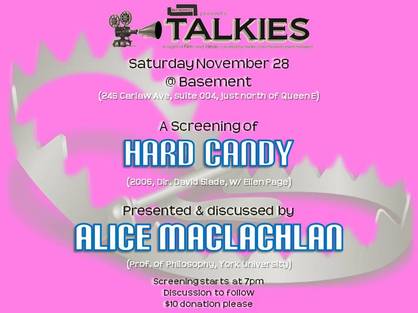“Revenge is a kind of wild justice, which the more man's nature runs to, the more ought law to weed it out.” Francis Bacon, “Of Revenge”
“Sweet is revenge – especially to women.” Lord Byron, “Don Juan”
“Am I born a cute little vindictive bitch or did society make me that way?” Hayley (Hard Candy)
HARD CANDY (dir. David Slade, 2005) is typically billed as a dark, twisted and deeply disturbing psychological thriller, one that perhaps belongs in the horror section of your local video store. This billing is not inaccurate; the film charts a fast-paced and vicious cat-and-mouse game played out between Jeff (Patrick Wilson) and Hayley (Ellen Page) and, in doing so, it touches on difficult themes of pedophilia, sexual torture and violence. But what often gets overlooked is the way in which Hard Candy appropriates and subverts elements from two familiar kinds of stories: the avenger narratives of classic westerns and martial arts films, and an increasingly popular set of narratives in which victims of sexual violence learn to “fight back”. While few of us condone vigilante justice in the real world, many are undeniably drawn to the mysterious figure of the cold-blooded avenger when presented on the screen. Hard Candy invites us to challenge what we expect from stories of sexual violence, and from stories of revenge – and in particular, how our comfort with and our enthusiasm for the cinematic avenger is deeply gendered.
ALICE MACLACHLAN is an assistant professor in the Department of Philosophy at York University, specializing in theoretical ethics and in social and political philosophy. She received her PhD from Boston University in 2007, and studied previously at Queen’s University (Canada) and Cambridge University (UK). Her current research topics include apology, forgiveness and reconciliation – though she finds the morality of revenge equally intriguing. She also has interests in the politics of gender and sexuality.
“Sweet is revenge – especially to women.” Lord Byron, “Don Juan”
“Am I born a cute little vindictive bitch or did society make me that way?” Hayley (Hard Candy)
HARD CANDY (dir. David Slade, 2005) is typically billed as a dark, twisted and deeply disturbing psychological thriller, one that perhaps belongs in the horror section of your local video store. This billing is not inaccurate; the film charts a fast-paced and vicious cat-and-mouse game played out between Jeff (Patrick Wilson) and Hayley (Ellen Page) and, in doing so, it touches on difficult themes of pedophilia, sexual torture and violence. But what often gets overlooked is the way in which Hard Candy appropriates and subverts elements from two familiar kinds of stories: the avenger narratives of classic westerns and martial arts films, and an increasingly popular set of narratives in which victims of sexual violence learn to “fight back”. While few of us condone vigilante justice in the real world, many are undeniably drawn to the mysterious figure of the cold-blooded avenger when presented on the screen. Hard Candy invites us to challenge what we expect from stories of sexual violence, and from stories of revenge – and in particular, how our comfort with and our enthusiasm for the cinematic avenger is deeply gendered.
ALICE MACLACHLAN is an assistant professor in the Department of Philosophy at York University, specializing in theoretical ethics and in social and political philosophy. She received her PhD from Boston University in 2007, and studied previously at Queen’s University (Canada) and Cambridge University (UK). Her current research topics include apology, forgiveness and reconciliation – though she finds the morality of revenge equally intriguing. She also has interests in the politics of gender and sexuality.

